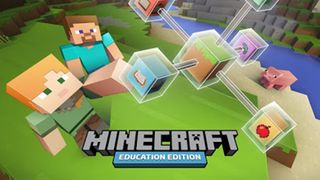The extremely fun and engaging Minecraft for Education online platform provides thrilling experiences for students to escape the real world and participate in virtual learning without them even realizing they are learning!
For an overview of Minecraft for Education, check out “What is Minecraft: Education Education?”
Minecraft: Education Edition provides a comprehensive collection of sample lessons for a wide range of topics including: art and design, climate and sustainability, computer science, equity and inclusion, digital citizenship, language arts, history and culture, math, science, and social-emotional learning. Consequently, this sample lesson is focused on using Minecraft: Education Edition to develop students’ soft skills, specifically the 4 Cs of critical thinking, collaboration, communication, and creativity, all of which can be incorporated with one of your existing lessons or one from the Minecraft: Education Edition resources.
Topic/Skills: The 4 Cs (Critical Thinking, Collaboration, Communication, and Creativity)
Grade Band: All
Learning Objectives:
At the end of the lesson, students will be able to:
- Use critical thinking skills to problem solve, make decisions, and reason
- Collaborate with a peer
- Communicate ideas
- Create alternative options and structures within a digital word platform
Minecraft: Education Edition - Critical Thinking
While using Minecraft: Education Edition, have students practice their critical-thinking skills by having them problem-solve, make decisions, and reason, while building structures, cities, and worlds. You could create a critical-thinking companion template for students in which they will need to stop and answer questions about their process, the decisions that they have made in choosing materials, and placement of materials, as well as how they would or could do things differently. While students are already using higher-level thinking skills during the game, having targeted questions for them to respond to will only enhance the experience.
Collaboration
While Minecraft: Education Edition can be played independently, playing with peers exacerbates the excitement and experience. Collaboration takes skill and effort from all parties involved.
To build students' collaboration skills while playing Minecraft: Education Edition, teach them about the importance of shared responsibility and flexibility. Compromising and co-creating shared solutions while engaging in the game should be the focus, while also placing value on what each peer individually contributes.
Also expose students to different peers each time you create an assignment so they have a chance to work with people who have different perspectives and abilities than them, which they will also experience in adulthood.
Communication
Having the ability to express ideas through verbal and written modalities is an important skill for students to have. Luckily, when playing Minecraft: Education Edition, there are many opportunities for students to communicate with their peers who they are collaborating with.
Require students to share their ideas and next moves with their peers, including their rationale, before making any moves. Similarly, students should be able to communicate how their experience was and ideas for improvement in the future.
Creativity
Minecraft: Education Edition can be used to develop students' creativity skills. By emphasizing divergent thinking and having students brainstorm ideas, they will be well-positioned to develop their creative capacities.
It is important to note that when focusing on students’ creativity skills, explain that you are concerned with the process, not the product. You can also have students create work on Minecraft: Education Edition individually, and then exchange and share how to build off of their peers’ worlds to create something different.
Does Minecraft: Education Edition Offer Teacher Training?
Similar to other programs such as the Google Certified Educator program, Minecraft offers a Teacher Academy for free in which teachers can become Minecraft certified. Not only will you learn more about using Minecraft for Education, but you can also engage in free PD and build your professional resume.
What is a Special Feature of Minecraft: Education Edition?
Minecraft: Education Edition has partnered with the Nobel Peace Prize Center and Games for Change, to teach students about being an active citizen. As our world continues to experience civil unrest, violence, and shifts in power and privilege, it is important to expose students to their challenges as well as provide solutions in which they can take an active role in society in ultimately making the world a safer and more inclusive place for all. Within the active citizen content within Minecraft Education Edition, students will have an opportunity to digitally engage with Nobel Peace Prize laureates, go through the world virtually, and learn and experience how to make decisions that impact change.
Minecraft may be an online game that you see students spending hours enjoying, however, Minecraft: Education Edition provides pathways to build students’ critical thinking, collaboration, communication, and creativity skills, while also helping them to grow as social innovators and active citizens. Give Minecraft: Education Edition a try in one of your lessons!

